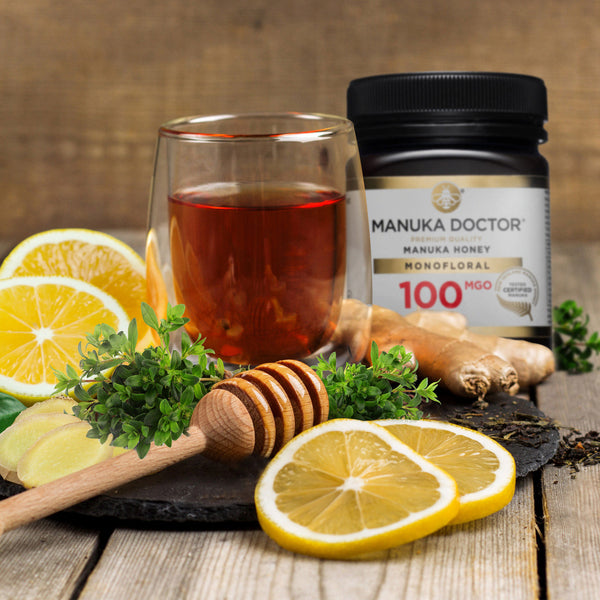- Follow these simple expert tips
- Fully backed by science
- And easy to follow every day
Do you dread the colder, darker days? Your mood, energy and overall wellbeing can all drop in the winter, so it’s not surprising lots of us associate this time of year with shivering away indoors, feeling below par. The lack of daylight can trigger the ‘winter blues’, causing symptoms including low mood, fatigue and cravings for stodgy food.1
Meanwhile, cold and flu bugs tend to be more prevalent at this time of year. There are a number of reasons this may be the case, with studies suggesting everything from colder temperatures and weak sunlight, to spending more time indoors, mixing with others, could be to blame for the surge in viruses.2
Winter doesn’t have to be this way, though. There are some simple steps you can take to stay well and fight off coughs, colds and flagging spirits, so you can breeze through the chillier months sparkling with vitality.
Keep cosy this winter
There’s evidence wrapping up warm will prevent colds taking hold. One study from Cardiff University found people whose feet became chilled were more likely to develop a cold when exposed to the virus.3 The reason? Lots of us harbour dormant infections in our noses but have no symptoms. However, if you become chilly, the blood vessels in your nose constrict, shutting off the supply of warm blood that’s packed with white blood cells to fight off infection. So the virus lying dormant in your nose gets stronger and cold symptoms develop. There’s also evidence cold, rainy weather can make you feel more depressed.4 But while you can’t control the weather, you can keep cosy all winter, fending off colds, coughs and low mood. Snuggle up in lots of thin layers to keep you insulated – this also means you can easily add and remove layers as needed. Don’t forget thick socks, gloves and a hat if you’re heading out.
Head outside
This may seem counter-intuitive but it’s important to get as much daylight as possible – yes, even on the chilliest, most miserable winter’s day. That's because we get a lot of Vitamin D from natural sunlight. Meaning that if you stay inside during the Winter, you could become deficient.
Research from the Psychiatric University Clinic, Basel, Switzerland, found 50 per cent of people with winter depression reported their mood lifted after just one week when they walked outside for an hour each morning.5
Your immune system will thank you, too. Studies have found walking in nature can boost levels of the immune system’s virus-gobbling white blood cells – so you may pick up fewer coughs and colds if you incorporate a stroll into your daily routine.6.
To avoid becoming deficient, Public Health England recommend people take a daily Vitamin D tablet during the Winter.
Try Manuka Doctor's High Strength Vitamin D supplement. An easy to take one a day capsule.
Eat – and drink – yourself healthy
There’s some truth to the old adage you should ‘feed a cold’, with a US study showing that eating encourages the production of a type of immune system cell that helps devour viruses.7
Choose hot, hearty meals – research from the University at Buffalo, New York, US, has found warming comfort foods can boost your mood, helping you feel more content and connected,8 a positive for your overall wellbeing.

Upgrade your honey! Choose Manuka
Make sure you stock up on Manuka Honey when you’re filling your kitchen cupboard with wellness-boosting foods.
Honey’s one of your biggest culinary allies throughout the winter, with a 2018 review of studies describing it as a single food that combines many medicines, as it has a range of properties that help soothe inflammation and fight infection.9 Manuka Honey, in particular, has been shown to have powerful antibacterial properties, while emerging research also suggests it may battle viruses.10
Why not power up your winter wellness with higher MGO-rated Manuka Honey? MGO stands for methylglyoxal, which is the magic ingredient that gives Manuka Honey its health-boosting effects.
The higher the MGO rating, the bigger its wellbeing benefits. You can add Manuka Honey to porridge or slather it onto toast – or simply have it neat from a spoon, a delicious way to take medicine.
Or you could enjoy Manuka Honey in a hot drink. Hot, flavoursome drinks can help stimulate the nasal and throat secretions that soothe coughs, stuffy noses, sore throats and other cold symptoms, according to research.11 Hot honey and lemon’s a cold-weather classic for this reason – with lemon, rich in immune-supporting vitamin C, and honey, shown to soothe coughs,12 it’s the perfect drink to reach for.
Try the benefits of ACV
Apple Cider Vinegar is a popular Winter Wellness tonic which many people drink in the colder months. ACV contains acetic acid and probiotics to support wellness. It mixes really well with Manuka honey. In fact, Manuka Doctor make a range of Apple Cider Vinegar which contains 30% Genuine Manuka Honey in each bottle.
Wash your hands – frequently!
Cold viruses live on hard surfaces like door handles and tables. From there, they can get transferred to your hands, and then, if you touch your eyes or nose, find their way into your body and cause those dreaded symptoms. So one of the best ways to keep colds away is to wash your hands regularly. Wash thoroughly, with warm water and plenty of soap.
Medical Experts agree that washing your hands is one of the most effective ways to keep yourself germ-free in the Winter months. You can read Dr Hilary Jones' advice about handwashing here.
That's because nasty Winter bugs like norovirus (the Winter Vomiting Bug) can be transmitted on surfaces and by hand contact. You can read how to protect yourself from Norovirus here.
Prioritise sleep
Your immune system will thank you for hitting the hay early, as sleep’s vital to keep it ticking over efficiently. One of the best ways to ensure a good night’s sleep is to practise good sleep hygiene – this means creating the right conditions for sleep. Take at least half an hour to unwind before bed, avoiding your smartphone, tablet, TV and laptop, and instead doing something calming, such as reading, having a long soak in the bath, meditating, doing some yoga stretches or listening to music. Make sure your bedroom’s cool, dark and quiet – the best environment for a solid, immune-boosting night’s sleep.
Support your immune system this winter with a Vitamin D Spray
Manuka Doctor’s Vitamin D spray is a popular immunity product for the winter months.
This pocket-sized immunity product contains more than 100 sprays, with enough Vitamin D to help support your immune system.
But don’t just take our word for it!
Expert Dr Michelle Braude has been trying our Vitamin D spray for the last few months and writes about her experience below.

“If you’ve been following me on Instagram for a while you’ll know that Vitamin D is one supplement I recommend that everyone should take.
I write about it in both my books and advise all my clients to take it
It's essential for immunity, bone health, mood, energy levels, disease prevention and so much more.
Now that we’re in the midst of winter, it’s more important than ever to look after our immunity – with everyone seeming even more prone to picking up colds and other bugs (I think almost 2 years indoors hasn’t helped our immunity!) And Vitamin D is an essential supplement to give our immune system a helping hand.
I always tell my clients that prevention is better than cure. Don’t leave starting healthy habits until you’re ill - start them while you’re feeling well.
The best new habits are the ones that are easiest to incorporate into your daily life, which is why I absolutely love the Vitamin D Spray with Manuka Honey and Bee Propolis from Manuka Doctor.
It’s so easy to add to your daily routine, it takes literally 2 seconds to spray and tastes delicious as you reap the benefits of all the ingredients.
Propolis is a by-product of honey and has been used for millennia. It’s a glue-like compound that coats the beehive and is said to have antifungal, antibacterial, antiviral and anti-inflammatory properties. Plus, some studies suggest propolis may have a role in helping the body to fight viruses.
The potential antiviral properties of propolis combined with the antibacterial qualities of Manuka honey and health benefits of Vitamin D really add a powerful punch to what should be a staple in your supplement cupboard all winter long. I hope you love it as much as I do.”
You can read more from Dr Michelle Braude here.

